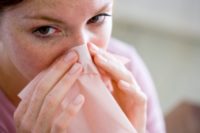 More than a quarter of American workers always go to work when they’re sick, according to a a new survey from NSF International, a global public health and safety organization.
More than a quarter of American workers always go to work when they’re sick, according to a a new survey from NSF International, a global public health and safety organization.
The survey found that an additional one-third (34 percent) wait until they experience the full effect of their symptoms before deciding to stay home.
Why go to work when you’re sick?
Four in 10 (42 percent) of American workers say they come to work sick because they have deadlines or would have too much work to make up when they return to the workplace after a sick day. Nearly as many (37 percent) say they can’t afford to be sick and miss work. One-quarter (25 percent) of American workers claim that they go to work when they are sick because their boss expects them to come to work no matter what. An interesting finding: men (33 percent) are nearly twice as likely as women (17 percent) to go to work when sick.
What do your co-workers think?
When asked how workers feel about their co-workers coming to work sick, two-thirds (67 percent) of respondents consider their sick co-workers to be hard workers. Additionally, 57 percent responded that they believe sick colleagues can’t afford to miss work. Only 16 percent of workers felt that colleagues who came to work sick were selfish and didn’t care about the well-being of their co-workers, and 13 percent believed co-workers come to work sick because they don’t trust their colleagues to do the job while they are out.
A majority of Americans (57 percent) would tell a sick co-worker to go home if they thought he/she was too sick to be at work. Additionally, Americans would not hesitate to ask their ill colleagues to refrain from entering their workspace (26 percent) or using their work supplies like staplers, computer, etc. (24 percent).
Be on the defensive
“The best thing you can do to avoid getting sick at work is to take defensive measures,” said Rob Donofrio, Ph.D., microbiologist at NSF International. “Proper handwashing with soap and warm water is still, by far, the best way to prevent the spread of germs and bacteria. Similarly, disinfecting common areas like the office kitchen or eating area, copy machine and printer can be crucial to keeping germs at bay.”
“If you are sick, try to stay home and rest at the onset of your symptoms when you are most contagious. However, if you must go into work, be conscientious of those around you,” continued Donofrio. “Fully cover your mouth when coughing or sneezing, wash your hands often, disinfect areas you come into contact with – especially in common areas – and try to keep your distance from co-workers. It’s important for all employees to keep health top of mind in the workplace.”
Avoidance, vitamins, disinfectant
Nearly all American workers (94 percent) take some precautions when coming in contact with a sick co-worker. From washing their hands (87 percent) to using hand sanitizer (68 percent) or making an effort to avoid sitting or standing near a sick co-worker (54 percent), working Americans seem to be careful to avoid close contact with germs. Others disinfect their workspace when a sick co-worker leaves their space (44 percent), take a vitamin or supplement (39 percent) or avoid eating in or using common areas like break rooms, kitchens and cafeterias (32 percent).
For more information on avoiding the spread of germs, visit http://www.nsf.org/consumer-resources/studies-articles/germ-studies.
For tips on teaching children about proper handwashing to prevent the spread of germs, visit http://www.scrubclub.org.
About NSF International: NSF International is a global independent public health and safety organization that helps protect consumers by certifying products and writing standards for food, water, dietary supplements and consumer goods to minimize adverse health effects and protect the environment. Operating in more than 150 countries, NSF International is a Pan American Health Organization/World Health Organization Collaborating Center on Food Safety, Water Quality and Indoor Environment.





